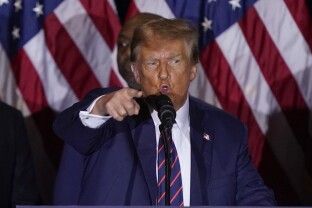Donald Trump is now the presumptive Republican presidential nominee and the vast majority of his party has fallen in line behind him. The few in Congress who haven’t have their reasons.
“Part of it is that I want to be able to tell my kids and my grandkids that I stood on my principles,” Sen. Mike Rounds told NOTUS.
Between both chambers of Congress, only 18 Republicans remain who openly refuse to endorse Trump. That’s becoming a more difficult position to have, even for the most ardent detractors. As just one example, see Rep. Chip Roy, who had endorsed Gov. Ron DeSantis’ campaign and once said members of his party were backing Trump “out of fear.”
“I publicly said that I’m voting for and supporting Trump,” he told NOTUS this week. “I publicly said on Fox last Thursday, for like a whole minute, espousing why we ought to be rallying around President Trump.”
Of the few remaining critics, most say they’re avoiding an endorsement either on moral high ground or long-standing political principles.
“Call me old fashioned, but sexual assault sort of does me in,” Sen. Mitt Romney told NOTUS. The former president was found liable for sexually abusing E. Jean Carroll in a civil case last May.
Romney is one of four Republicans still in the Senate who voted to convict Trump in his impeachment trial following the Jan. 6 riot. The other three senators — Bill Cassidy, Susan Collins and Lisa Murkowski — have said they won’t endorse Trump. Collins and Murkowski supported Nikki Haley’s losing primary campaign, and Cassidy has talked with No Labels about the group’s presidential plans.
Not endorsing Trump is a real risk for Republicans, who could find themselves primaried or crosswise with their own voters. Many Republican lawmakers who have criticized Trump have chosen to leave Congress altogether — including, most recently, Rep. Ken Buck.
Other Republican lawmakers have been less straightforward in why they’re sidestepping a Trump endorsement.
Sen. Todd Young of Indiana said last year that he would not support Trump and told NOTUS this week that hasn’t changed. “Nothing new, no new news,” he said.
Rep. Brian Fitzpatrick said he has a general principle of not weighing in on the presidential race. “I’ll never endorse a presidential candidate ever in my life, in or out of this office,” he told NOTUS.
“Good luck, yeah, I won’t talk to you,” Rep. Mike Lawler said when NOTUS asked if he’d share his reason for distancing himself from the former president.
Many Republican lawmakers who hadn’t yet endorsed Trump came off the sidelines once Haley suspended her campaign earlier this month, effectively ending the GOP primary. That included some of the most high-profile holdouts, like Senate Republican leader Mitch McConnell. “It should come as no surprise that as nominee, he will have my support,” he said in a statement after Super Tuesday.
Sign up for the latest from NOTUS.
For some Republicans representing districts Biden won in 2020, endorsing Trump once the primary ended was effectively a decision made by default.
Rep. David Schweikert said he would ultimately endorse Trump, as he consistently endorses the Republican nominee after the primary.
“Once the nominations are secure, and we’ve always done this, then we make it clear that we are voting for our nominee,” he told NOTUS. “I do that not only with the top of the ticket but almost every race.”
Most of the Trump holdouts don’t have any misconceptions about their influence on him. Gallagher was one of Trump’s most direct critics after Jan. 6 and still refuses to endorse him.
When asked about Trump by NOTUS, he simply said, “I don’t think the former president is even aware of my existence. … I don’t think he burns any calories on what Mike Gallagher says one way or the other.”
—
John T. Seward and Tara Kavaler are NOTUS reporters and Allbritton Journalism Institute fellows. Casey Murray, a NOTUS reporter and an Allbritton Journalism Institute fellow, contributed reporting.
Sign in
Log into your free account with your email. Don’t have one?
Check your email for a one-time code.
We sent a 4-digit code to . Enter the pin to confirm your account.
New code will be available in 1:00
Let’s try this again.
We encountered an error with the passcode sent to . Please reenter your email.


